
Automotive CRM: How Can It Improve Your Dealership Operation
 Updated on
Updated on
 By Bradley Kovacs
By Bradley Kovacs
Bradley Kovacs
Bradley has been passionate about technology since childhood, starting with Microsoft Flight Simulator at age six. In college, he automated his data e...
learn more
Bradley Kovacs
Bradley has been passionate about technology since childhood, starting with Microsoft Flight Simulator at age six. In college, he automated his data e...
Table of Contents
Table of Contents
Are you tired of spending hours managing customer interactions, sales leads, and daily dealership operations? Are you looking for a way to streamline your process and improve customer satisfaction while maximizing your ROI?
If so, an automotive CRM (customer relationship management) system may be the solution you've been searching for! With automotive CRMs, you can quickly track customer information, streamline sales processes, close more deals, and improve customer loyalty.
According to research, 80% of consumers purchase their vehicles online. This makes automotive CRMs an essential tool for automotive dealerships because they can help maximize customer satisfaction by providing customers with a smooth purchase journey.
Key Takeaways
- An effective automotive CRM streamlines lead management, automates follow-up tasks, and integrates seamlessly with your DMS and inventory to increase speed-to-lead and sales efficiency.
- The best software for you depends on your specific needs. Franchise dealers may require deep fixed-ops integration like CDK Global, while independent or sub-prime dealers might prioritize compliance tools like ProMax or agile communication tools like Ringy.
- Long-term success relies on choosing a user-friendly platform that your team will actually use, coupled with lifecycle features that turn one-time buyers into loyal service customers through automated retention marketing.
What Are Automotive CRMs?

Automotive CRM systems are software solutions designed to help automotive dealerships manage and analyze customer interactions and data throughout the customer lifecycle, aiming to improve customer relationships and drive sales growth.
Automotive CRMs can capture, store, and analyze customer data to improve customer interactions and loyalty. They allow businesses to track customer interactions, including sales, service, and communication history.
This allows companies to identify and target specific customer needs and preferences, leading to personalized marketing and sales efforts.
By leveraging automotive CRM software, automotive dealerships can simplify and automate their operations, freeing up valuable time to focus on other areas of their business.
Overall, automotive CRMs are crucial tools for managing customer interactions and data in the automotive industry. They allow businesses to improve customer loyalty and retention, increase sales, and streamline operations.
Benefits of a CRM Automotive Software
There are numerous advantages automotive CRMs offer automotive businesses:
1. Increased Efficiency
CRMs have proven to be an effective means of boosting productivity by up to 60% due to their ability to automate mundane tasks and streamline operations.
Automotive dealerships can use automotive CRMs to quickly access customer data, track vehicle sales, and manage customer interactions, making it easier for them to close more deals in a fraction of the time. As a result, your team can work more efficiently and effectively, increasing productivity and revenue.
2. Improved Customer Relationship Management
With all customer information readily available in one place, your team can quickly and easily access customer history, preferences, and interactions. This allows for more personalized and targeted marketing efforts and better overall customer satisfaction.
For example, automotive dealerships can use automotive CRMs to track customer interactions and send targeted emails with special offers. This helps automotive businesses build stronger customer relationships, leading to increased sales and customer loyalty.
3. Better Data Analysis & Sales Forecasting
Automotive CRMs allow automotive dealerships to measure key performance indicators (KPIs) such as customer acquisition costs and sales conversion rates. This allows automotive businesses to monitor their performance and make informed decisions about their strategies based on data-driven insights.
In addition, automotive CRMs enable automotive dealerships to better forecast future sales by tracking key metrics and trends in the automotive industry. This enables automotive businesses to prepare for peaks and troughs in the automotive market and make informed decisions about their operations.
4. Enhanced Sales and Marketing Strategy
Automotive dealerships can use automotive CRMs to send automated emails with special offers and discounts. This helps automotive businesses target specific customers based on their preferences, leading to increased customer loyalty and retention.
Moreover, automotive dealerships can leverage automobile CRM software to evaluate the efficacy of their promotional campaigns and capture sales leads in real time. This empowers automotive businesses to optimize their marketing initiatives and sales tactics for maximum productivity.
5. Better Inventory Management
This might seem like a minor benefit, but automotive CRMs can help automotive businesses keep track of their inventory better. Automotive dealerships can quickly access customer data and vehicle sales records to identify patterns and trends in the automotive market.
This allows automotive businesses to forecast future sales and order the right amount of inventory for specific dates and times.
6. Enhanced Security
The internet can be dangerous for business owners, and automotive dealerships are no exception. Unfortunately, automotive businesses are prime targets for cybercriminals seeking sensitive information.
Some of the information automotive dealerships store includes customer credit card numbers, vehicle sales records, and other confidential data.
Automotive CRMs help automotive businesses protect their data by providing enhanced security features such as two-factor authentication, encryption standards, and complex passwords. This helps automotive businesses safeguard their customer data while minimizing the risk of a data breach.
As you can see, automotive CRMs are a must-have tool for automotive dealerships looking to improve their operations and maximize sales. By leveraging automotive CRM software, automotive dealerships can ensure they are providing the best customer experience possible while increasing their sales and profits.
Features to Look For in a CRM for Automotive

When choosing automotive CRM software, there are several essential features to consider. These features should align with your automotive business’s needs and goals.
Some of the features you should look for when selecting automotive CRM software include the following:
1. Lead Management
A CRM for automotive with lead management capabilities can significantly improve the efficiency and effectiveness of an automotive dealership's sales and marketing efforts.
One of the key benefits of using an automotive CRM with lead management is the ability to centralize and organize all customer and prospect data in one place.
This includes contact information, sales and service history, and communication history, which can be used to understand better customer needs and preferences and tailor marketing and sales efforts accordingly.
Lead management tools within automotive CRMs allow dealerships to track and prioritize leads, assign leads to sales team members, and monitor lead progress through the sales funnel. This helps dealerships ensure that no leads fall through the cracks and that each lead is given the attention it deserves.
Finally, an automotive CRM with lead management can provide valuable analytics and reporting capabilities, allowing dealerships to track key performance indicators and identify areas for improvement.
This can help dealerships to optimize their sales and marketing efforts and make informed business decisions.
2. Automation Capabilities
Automotive dealers have many tasks to manage daily, including handling customer relationships, tracking sales and leads, and managing inventory. An automotive CRM system with automation capabilities can significantly improve efficiency and productivity for dealerships.
Here are some reasons automotive dealers should consider an automotive CRM with automation capabilities:
|
Automotive CRM Benefits |
Description |
|
Improved customer experience |
Automation capabilities in a CRM system can help dealerships streamline customer communication, providing faster response times and more personalized interactions. This can improve the overall customer experience and increase customer loyalty and repeat business. |
|
Increased sales |
Automation allows dealerships to optimize their sales and marketing processes, from managing leads, conducting follow-ups, launching campaigns, and personalizing emails. |
|
Increased efficiency |
Automation features enable dealerships to automate mundane tasks such as appointment booking, follow-up emails, and customer data entry, granting them more time for projects of greater significance. |
|
Reduced errors |
Automation can significantly reduce the chances of any errors occurring during data entry, appointment booking, and customer communication. This ensures that dealerships remain efficient and avoid making costly mistakes while maintaining a professional reputation. |
In summary, automotive dealers could benefit significantly from adopting an automated CRM system to enhance customer experience, maximize sales opportunities and revenue growth, boost efficiency levels within the dealership and minimize mistakes.
3. Analytics
An automotive CRM with analytics gives dealerships the insight to trace and review customer interactions, enabling them to better discover their wants and desires. This data can then be utilized to customize sales approaches that appeal uniquely to each client, leading to higher customer satisfaction and prolonged loyalty.
Additionally, an automotive CRM with analytics allows dealers to track the performance of their sales and marketing efforts, identifying which strategies are most effective and which are not.
This can help dealers to optimize their resources and focus on the most effective tactics, resulting in increased efficiency and revenue.
Furthermore, an automotive CRM with analytics provides dealers with real-time data and insights, allowing them to make informed, data-driven decisions to improve their operations and stay competitive in the marketplace.
4. Contact Organization & Segmentation

An automotive CRM with contact organization and segmentation capabilities can save automotive dealers time and effort in managing customer relationships. This allows them to filter easily, sort, organize, and group contacts according to specific criteria such as age, location, or purchase history.
Organizing customers into groups makes it easier for automotive dealers to build highly-targeted marketing campaigns. This helps to ensure that their messages reach the right people and are more likely to be successful.
Contact organization and segmentation also enable automotive dealers to provide personalized customer service, helping them build strong customer relationships and increase customer retention rates.
Overall, automotive CRM with contact organization and segmentation capabilities can help automotive dealers stay organized, save time and maximize their outreach efforts to build a solid customer base.
5. Automated Reports
Automated reports give automotive dealers real-time insight into their operations, allowing them to track progress, identify potential issues and make informed decisions quickly.
An automotive CRM with automated report capabilities can provide dealers with up-to-date information on customer activities, sales and marketing performance, inventory levels, and more. This helps automotive dealers stay informed of the current state of their dealership and act accordingly to optimize their operational efficiency and maximize their sales.
Moreover, automated reports allow automotive dealers to quickly identify trends in customer behavior that can be used to build better sales strategies for increased customer satisfaction and revenue growth.
By leveraging automotive CRM software, automotive dealers can improve customer experience, boost sales and revenue growth, optimize efficiency and minimize mistakes.
How to Choose an Automotive CRM for Your Dealership
When selecting an automotive CRM system, there are several key criteria that automotive dealers should consider:
Match the CRM to Your Dealership Size and Structure
Choosing the right automotive CRM software starts with understanding your specific operational footprint. If you operate a single rooftop, you might benefit from a lean, sales-first tool with simple workflows.
However, larger dealership groups typically require enterprise-grade integrations that offer centralized reporting and cross-store visibility.
You must ensure the platform handles shared customer profiles effectively so that data isn't siloed between locations. Ask yourself if you need an all-in-one suite covering sales, service, and marketing, or if a specialized tool fits your current stack better.
Ultimately, the system must support your expected growth in users or rooftops without becoming unwieldy or fragmented.
Prioritize Strong Lead Management and Marketing Automation
To stay competitive, your dealership CRM software must act as an engine for growth, not just a database. Look for a system that automatically captures and categorizes leads from every source, reducing manual entry.
- AI and Speed: Evaluate AI features that assist with speed-to-lead and intelligent nurture sequences.
- Automation: Robust tools for task reminders, drip campaigns, and chat follow-ups are essential to prevent leads from slipping through the cracks.
- Omnichannel: Ensure the platform supports SMS, email, and calls in one centralized hub. By automating these processes, the best CRM for automotive industry use allows your team to focus on closing deals rather than organizing lists.
Evaluate Inventory and DMS Integration Capabilities
Seamless integration is the backbone of functional CRM in automotive industry operations. You must verify compatibility with your existing DMS (like CDK or Reynolds & Reynolds) to ensure real-time synchronization of vehicle data, pricing, and incentives.
A car dealership CRM that lags in updating inventory availability can lead to embarrassing customer interactions and lost trust.
Furthermore, look for support for desking tools, appraisal systems, and credit modules directly within the interface. Being able to embed inventory specifically into follow-up messages is a game-changer for customer engagement. Always ask if these integrations require custom development or additional fees before signing the contract.
Assess Ease of Use and Team Adoption
Even the most advanced automobile CRM software fails if your team refuses to use it. Ease of use is paramount; always ask for a live demo to test usability on both desktop and mobile devices. Smooth onboarding is crucial, so investigate whether the vendor offers comprehensive training, setup support, or ongoing coaching.
Tools with intuitive workflows ensure consistent data entry and fewer skipped tasks, allowing new sales reps to become productive quickly. The goal is to choose automotive CRMs that reduce the administrative burden rather than adding to it, ensuring your staff spends more time with customers and less time clicking buttons.
Look for Built-In Communication Tools
Modern CRM software for car dealerships must centralize communication to maintain control and compliance.
- Native Tools: Ensure the system supports texting, calling, email, and video messaging natively, automatically logging every interaction to the customer profile.
- Automation: Look for templates and automation triggers that streamline workflows and save time.
- Speed-to-Lead: Features like auto-responses and instant notifications are vital for capturing interest immediately.
- Compliance: Strictly evaluate whether messaging tools comply with TCPA and opt-in regulations to protect your business from liability.
Choose a CRM That Supports Long-Term Customer Retention
After helping you close the sale, a great CRM automotive solution builds loyalty through targeted drip campaigns. Look for lifecycle features that bridge the gap between sales and service, such as automated service reminders, equity mining, and ownership tracking.
The system should support personalized communications based on vehicle age, mileage, or loyalty status to keep your dealership top-of-mind.
Consider Scalability and Future Growth
Choose a CRM automotive industry platform built on a cloud-first architecture that can evolve with you. As your dealership grows, you may need modular add-ons like AI tools or advanced marketing suites.
Assess whether the platform supports API access for future integrations and if it can handle increased lead volume or additional rooftops without performance issues. The right partner will have a roadmap aligned with digital retailing and omnichannel evolution, ensuring your technology remains relevant as the market changes.
Review Support, Training, and Vendor Reputation
Finally, the vendor behind the automotive CRM is as important as the software itself. Do they offer 24/7 support or dedicated specialists who understand the car business? You need to know that onboarding and data migration will be handled professionally.
Review case studies and dealer testimonials to gauge long-term satisfaction and confirm the vendor has experience with dealerships of your size.
6 Best CRM for Automotive Industry
There is no "one-size-fits-all" solution in the automotive market. The best automotive CRM software for you depends on whether you prioritize deep DMS integration, credit compliance, or high-speed lead communication.
Below is a quick comparison of the top platforms to help you navigate the options.
|
Software |
Best For |
Pricing |
|
High-velocity sales teams needing affordable automation |
Starts at ~$119/month for unlimited seats |
|
|
Full dealership ecosystem with deep DMS integration |
Quote-based |
|
|
Equity mining and inventory-integrated workflows |
Quote-based / Custom |
|
|
Customizable workflows and personalized marketing |
Quote-based / Custom |
|
|
Sub-prime dealers requiring credit and compliance tools |
Quote-based / Custom |
|
|
Simpler sales processes focusing on visual pipelines |
Starts at ~$39.90/user/mo billed annually |
*Note: All pricing details are accurate as of December 2025.*
1. Ringy (That's us)

Ringy is a powerhouse for sales teams that prioritize speed and volume over complex inventory management.
Unlike traditional dealership CRM software that can feel clunky, Ringy focuses on high-velocity communication, ensuring your team connects with leads instantly. It is particularly effective for independent dealers or inside sales teams that need to automate follow-up without the bloat of an enterprise DMS suite.
Key Features:
- VoIP Softphone: Built-in calling allows agents to dial directly from the browser with automatic call recording.
- SMS Drip Automation: Create sophisticated text message sequences to nurture cold leads automatically.
- Pipeline Management: Drag-and-drop visual pipelines keep track of every deal stage.
- Mobile App: Full functionality on the go ensures you never miss a lead while on the lot.
- Lead Distribution: Automatically route new inquiries to the available agent best suited to close the deal.
Verdict: Ringy is an excellent choice if your primary goal is to increase contact rates and streamline communication without paying for heavy operational features you might not use.
2. CDK Global
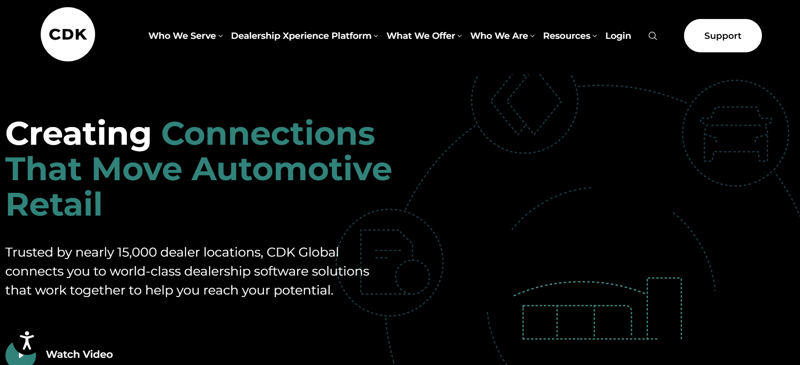
CDK Global (formerly Elead) is a heavy hitter in the CRM automotive industry, known for its unparalleled integration with dealership management systems (DMS). It is designed for franchise dealers who need a single source of truth across sales, service, and parts. Because it sits within the massive CDK ecosystem, data flows seamlessly between departments, reducing manual entry errors and ensuring that the service team knows exactly what the sales team promised.
Key Features:
- Deep DMS Integration: Real-time data sync prevents silos between your sales floor and finance office.
- Service & Fixed Ops: robust tools to mine service drive data for trade-in opportunities.
- AI Virtual Assistant: Automated engagement tools that qualify leads 24/7 before handing them to a human.
- Desking Tools: Integrated quoting features that help structure deals without leaving the CRM.
Verdict: If you are a large franchise dealer already using CDK for your DMS, this is the logical choice to unify your operations and maximize data visibility.
3. DealerSocket CRM
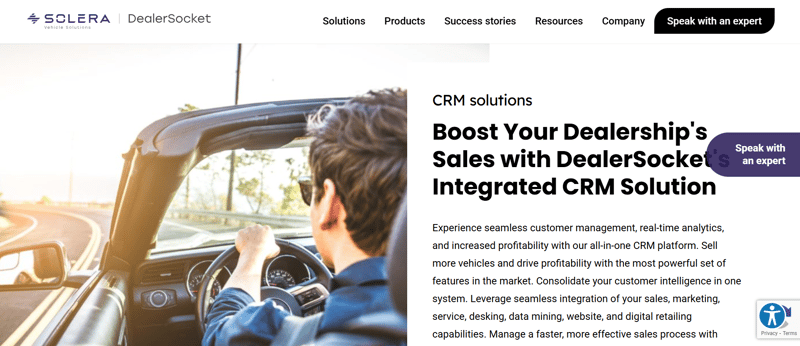
DealerSocket is widely recognized for its robust ability to turn data into profit. This automotive CRM shines when it comes to "equity mining"—identifying past customers who are in a good position to trade up. It is built to support the entire lifecycle of the customer, making it a favorite for dealerships focused on retention and loyalty. The platform is highly mobile-friendly, allowing sales reps to scan licenses and inventory directly from the lot.
Key Features:
- RevenueRadar (Equity Mining): Automatically flags customers in your database who are ready to buy based on equity and payment position.
- SocketTalk: A compliant texting solution that keeps all communication logged within the customer record.
- Mobile Sales App: Allows reps to complete tasks, scan VINs, and push deals forward from their smartphones.
Verdict: DealerSocket is ideal for dealers who want to maximize the value of their existing database and improve retention through proactive data mining.
4. VinSolutions CRM (Connect CRM)
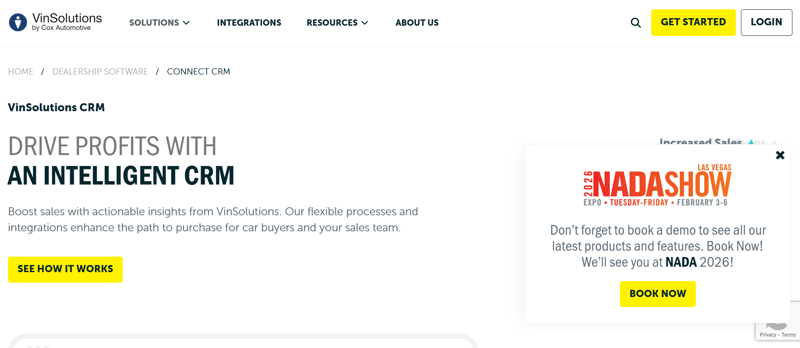
VinSolutions, part of Cox Automotive, offers one of the most customizable car dealership CRM platforms on the market. Its "Connect CRM" focuses on flexibility, allowing you to tailor workflows to match your specific sales process rather than forcing you to change how you work. With powerful backing from Cox, it integrates well with other industry giants like Autotrader and Kelley Blue Book, providing rich data insights that help personalize every customer interaction.
Key Features:
- Customizable Workflows: Tailor follow-up schedules and tasks to fit your unique dealership culture.
- Connect Automotive Intelligence: Uses AI to analyze customer buying signals and predict readiness to purchase.
- Marketing Automation: targeted campaigns that deliver the right message based on customer behavior and vehicle history.
Verdict: VinSolutions is perfect for dealerships that want full control over their processes and require deep consumer insights to drive personalized marketing.
5. ProMax
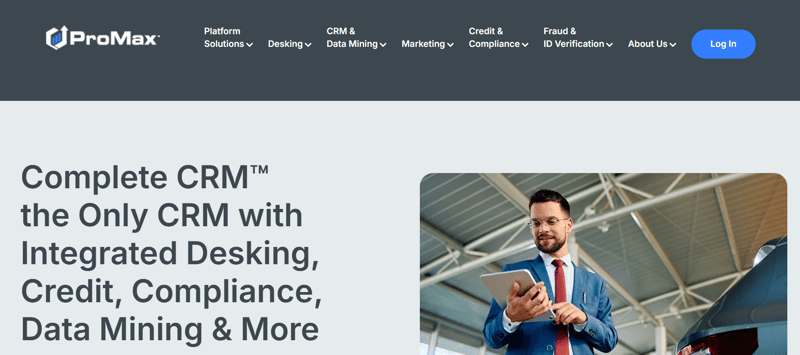
ProMax differentiates itself by being the only automobile CRM software that started as a desking and credit solution. This history makes it the go-to choice for dealerships with a strong focus on sub-prime or special finance. It integrates credit reports and compliance checks directly into the sales workflow, ensuring that you are working the right deal for the customer's budget from the very first interaction.
Key Features:
- Credit & Compliance: Instant access to credit bureaus and compliance checks integrated into the lead log.
- Desking & Leasing: Powerful tools to calculate payments and structure deals profitably in seconds.
- Inventory Management: robust features to manage stock, photos, and window stickers alongside your customer data.
Verdict: If your dealership relies heavily on special finance or "Buy Here Pay Here" models, ProMax offers the specialized compliance and credit tools you need to stay safe and profitable.
6. Teamgate CRM
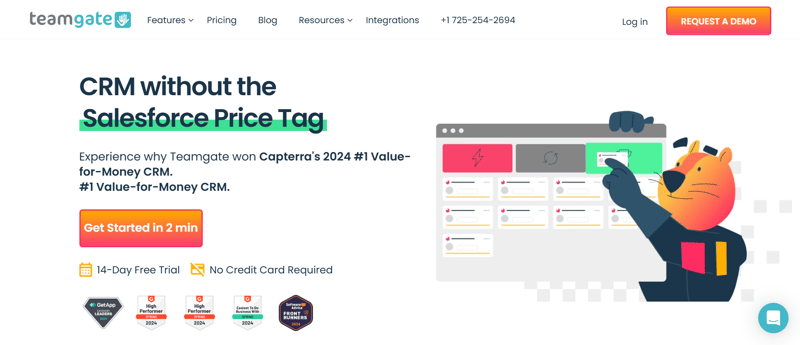
While not exclusively an "automotive-only" tool, Teamgate has gained traction among independent dealers who need a CRM for automotive sales that is simple, visual, and effective. It strips away the complexity of enterprise DMS systems, offering a clean, visual sales pipeline that is easy for anyone to learn. It is particularly strong in analytics, helping smaller teams understand exactly where they are winning or losing deals without needing a data scientist.
Key Features:
- SmartDialer: Native in-app calling with auto-dialing capabilities to power through lead lists.
- Visual Sales Pipeline: A clean, drag-and-drop interface that makes managing deal stages intuitive.
- Sales Insights: Easy-to-read reports on team performance, conversion rates, and future forecasting.
Verdict: Teamgate is a smart, budget-friendly option for independent dealers or brokers who need a modern sales tool without the heavy price tag of franchise-level software.
Conclusion

Automotive CRM software is an essential tool for automotive businesses of all sizes. Whether you’re looking to increase efficiency or maximize profits, the right automotive CRM solution can help you take your dealership to the next level.
Ringy is a wholesome CRM that can help car dealerships streamline their sales and customer relationship management processes - leading to increased efficiency and profitability. If you're ready to start leveraging automation to drive more leads into your marketing funnel and convert them into sales, give Ringy a try today!

Skyrocket your sales with the CRM that does it all.
Calling? Check. SMS? Check. Automation and AI? Check. Effortlessly keep in touch with your customers and boost your revenue without limits.

Take your sales to new heights with Ringy.
Sales in a slump? Ringy gives you the tools and flexibility you need to capture leads, engage with them, and turn them into customers.
Subscribe to Our Blog
Enter your email to get the latest updates sent straight to your inbox!
Categories
Related Articles




































































































